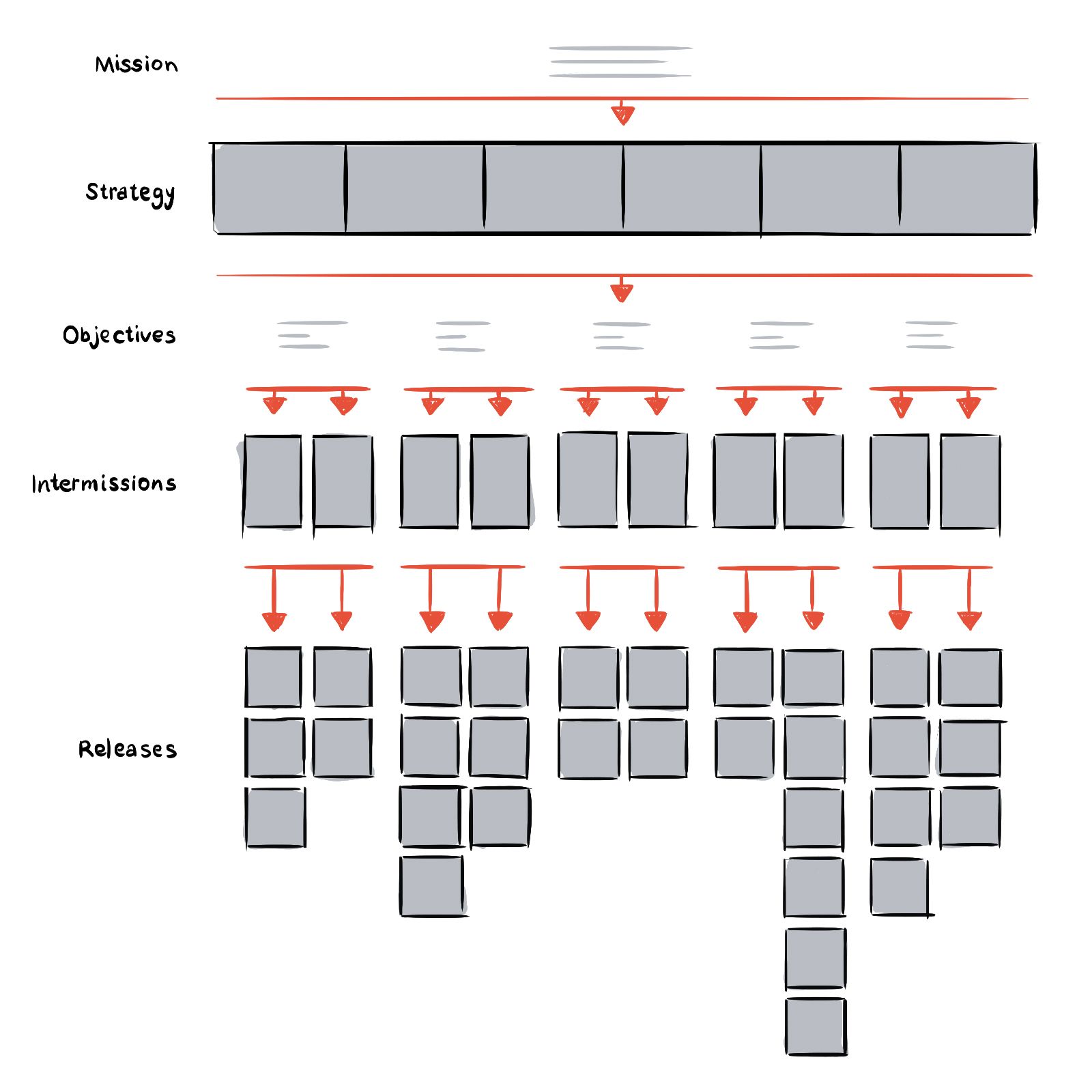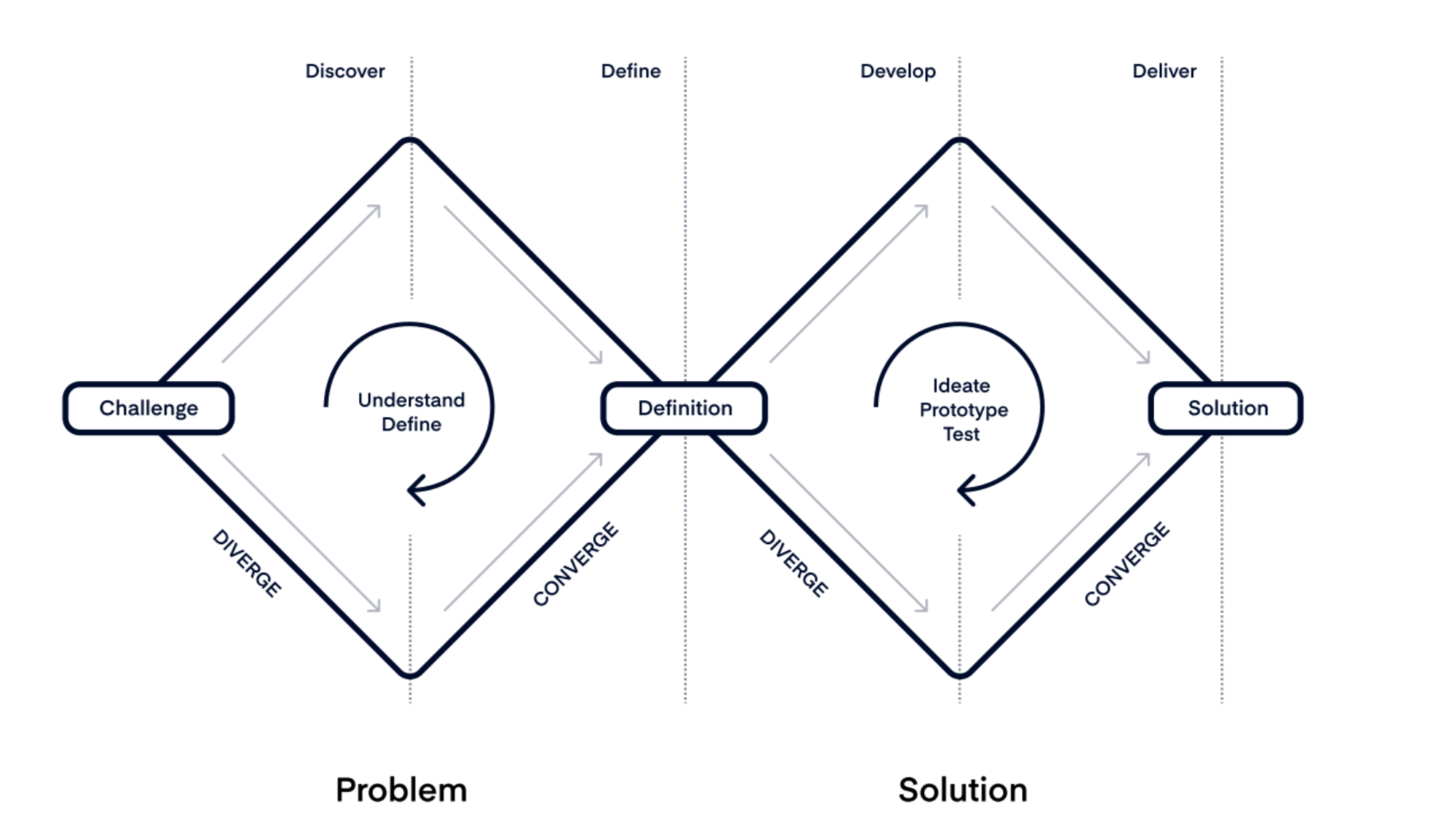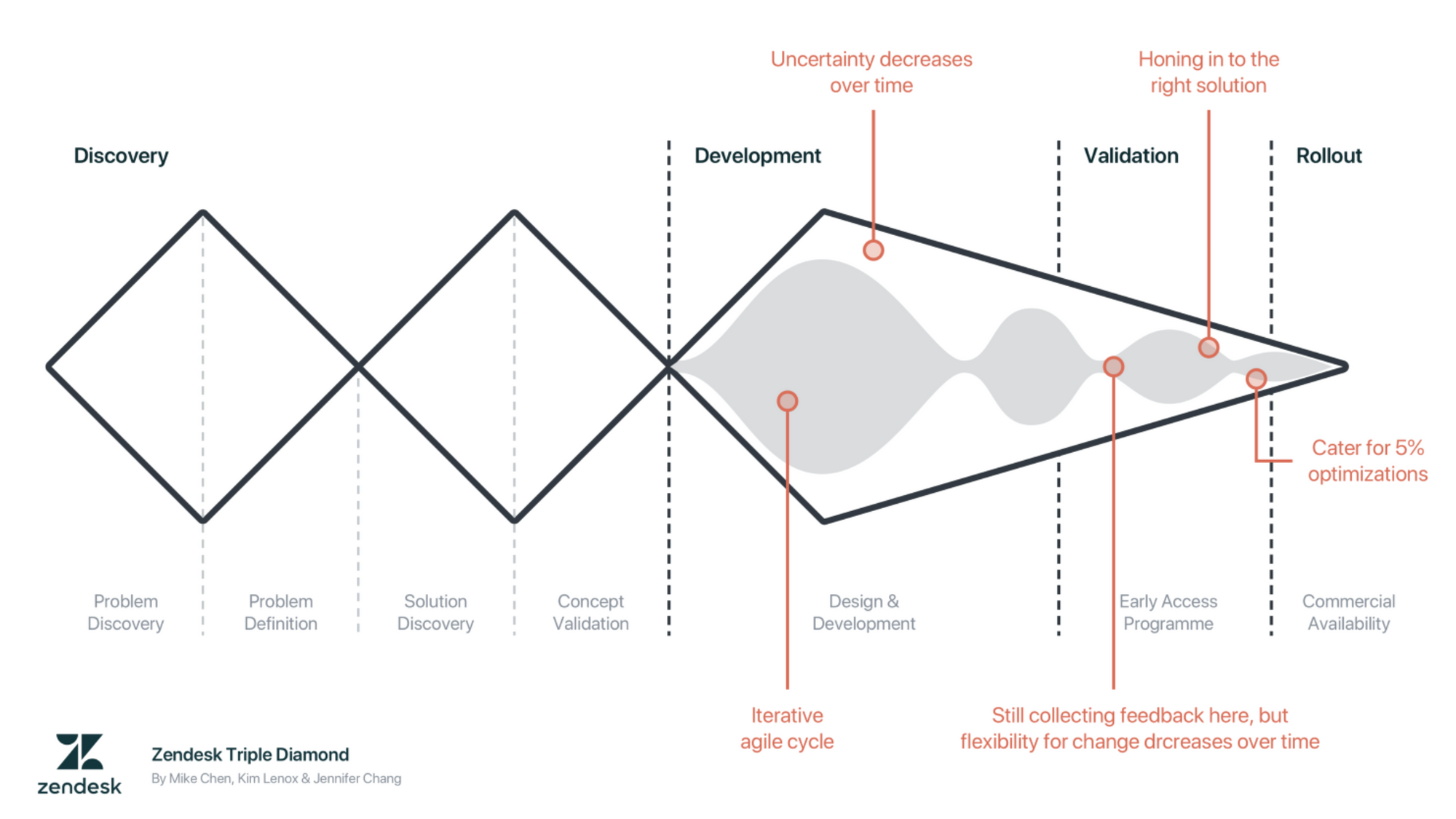Product Discovery Guide — Playbook & Frameworks (2023)
Innovation begins with uncertainty. Every great product starts as a foggy notion lacking shape and substance. But through deliberate product discovery, successful teams transform those raw seeds of ideas into beloved products rooted in real customer needs.

Discovering innovative features and products
Product discovery is the process of uncovering unmet customer needs and discovering the right feature or product to build through iterative validation.
In executing great product discovery, you are like a scientist, but instead of uncovering new knowledge about nature, you're discovering secrets about people, and their wants and needs.
"Secrets about people are different: they are things that people don’t know about themselves or things they hide because they don’t want others to know. What secrets are people not telling you? You can’t find secrets without looking for them. – Peter Thiel, Zero to One
Unmet needs vary – it may be a market that is completely underserved or it might be met by an incumbent product (including yours), but filled with frustration.
Underserved markets typically appear in two places: old, boring markets that the world stopped innovating around, and new, emergent markets that are missing a vibrant ecosystem of functionality.
Product discovery is messy and hard. Being innovative is equally hard because you're challenging the status quo and all of the assumptions that went into what the majority assume is the best way.
You can make this process easier by continually speaking with your customers and users to understand their needs. This builds your product sense and deep empathy for your customers.
Great product discovery requires...
- Access to real users and customers
- Deep understanding of their needs
- Creative ideas for solving valuable problems
- Aligning your organization to take risks
But it shouldn't be hard because of the process.
One of the best ways to execute this process is to start by finding these people or companies, offering to build a solution that solves the problem for them, and working closely with them on the first version.
In the B2B startup world these are called design partners – they are your first customers that heavily influence the product design decisions you make. Selecting great partners is crucial – a bad set will influence the product in a direction that won't meet broader market needs.
I'll break down how to build a repeatable product discovery practice in your organization and share tips from facilitating hundreds of workshops, and launching many successful products like Klu, Productboard, and Freeletics.
As a product leader at Productboard, I helped thousands of organizations adopt best practices and create a discovery practice.
What follows is everything I learned and helped companies with, distilled into an actionable guide for you to use.
We'll start from the basics and work our way into advanced concepts.
Product discovery involves understanding customer needs and using that knowledge to create products that are loved by and vital to the people using them.
The journey from abstract concepts to concrete solutions is a transformative voyage - often winding yet rewarding for those who embark upon it.

If you seek to develop truly impactful products, the path forward begins with enlightening discovery of non-obvious truths.
What are your users really trying to do?
What delights your users?
What frustrates your users?
To create truly innovative and not just new products, the best product development teams use a carefully crafted set of continuous research methods.
Product discovery allows teams to move from nice to have features and products to building products that solve problems and become a real need for customers.
Products that people love.
Or, as Paul Graham says: make something people want.
What you'll learn in this guide...
This hands-on tutorial will teach you how to go beyond conventional wisdom in order for Product Discovery to aid organizations in achieving real progress.
- Product Discovery Stages – Explore the steps of discovery and how it fits into the overall product development process, how to structure discovery for your initiative, and how to explore and converge on the right solution
- Discovery Techniques – You will also learn how to implement lightweight Product Discovery techniques with your team right away, as well as methods and rhythms that work will work for your team and company
- Aligning Your Organization – How to bring Product Discovery into your organization, and how execute the discovery process yourself as a leader
Need help kicking off your AI Product Discovery? Grab time with me for help.

Getting Started
In this guide, we summarize years of discovery and product strategy work to help you understand the product discovery process and the methods teams use to develop ideas that lead to innovative products.
I'll explained carefully crafted continuous discovery techniques and a process and framework to help you better understand the product discovery process so you can prepare your teams to build industry-leading products.
The product discovery process is a key step in the product development process that helps teams focus on developing features and products that deliver results.
Product Discovery is a process that helps you focus on what matters in your product. It helps you learn about your customers and their problems so you can build something they want. It's a key part of the agile process, and it's important to connect it to other processes like Scrum and user research.

Product Discovery is a process of reducing risk or uncertainty with problems worth solving and solutions worth building. It is typically conducted as a product trio or more expansion cross-functional team, and should focus on the problem space rather than the solution space.
The problem space is the area of focus for a product, while the solution space is where potential solutions are explored. It is important to differentiate between the two, as spending too much time on ideation can be counterproductive.
Before you start Product Discovery you need to have your Product Strategy clearly defined and understood by the team.

Discovery & Delivery
As this is the most customer-centric method of operation, the Product Manager and Product Designer should always be in Product Discovery mode.
Nonetheless, the Delivery and Discovery activities overlap and interact, with their respective peaks occurring at distinct periods in the product management lifecycle.

Discovery can include learning about your target audience, competitors, product range, and opportunity size. Discovery refers to the process of finding out exactly what problem you are trying to solve with your product.
This is a vital and distinct work step that should take place at the beginning of a project, but also something that product developers must continually do throughout the development process, during launch and beyond. A discovery is often referred to as a work package that is performed early in the development of a product to set the direction for product development.
It is important for the same team to own both Product Discovery and Delivery. Doing this grounds the working team in the problem by building empathy for the customer and their jobs to be done, while increasing intrinsic motivation to ship. It is ok to temporarily focus more on Delivery or Discovery at a given point in time, but the Product Team needs to have the skills and freedom to work on both aspects on their own time.
It is this “discovery” that allows product teams to make sure that their solutions meet real user needs and that users are willing to pay for them. The product discovery process involves getting a deep understanding of customers and then using that knowledge to create products that are vital to customers.
Design thinking is understanding the needs of potential product users, potential product users, the problems they face and their importance. Design thinking is a customer-centric approach to analyzing product requirements.
Strategy & Goals
The goal of this guide is to help connect Product Strategy and your Product Discovery/Delivery efforts through outcome-oriented goals.

There are four key pillars that influence your overall focus on Outcomes: Product Discovery, Product Strategy, Product Goals, and Product Roadmaps. As a Product Manager, it is essential that you understand what is within your scope and duty to improve and where clarity is required.
A good Product Discovery Strategy should be based on answering 4 core questions:
- What is the problem the feature or product is solving?
- What alternatives do uses solve this problem with today?
- What is the core value proposition for your solution?
- How is your feature or product differentiated from alternatives and competitors?
OKRs stand for Objectives and Key Results, and usually refers to the business strategy tool/framework that can be used in order to measure and track progress towards specific objectives.
Through outcome-oriented goals, you effectively connect your product strategy and objectives to your product development and delivery initiatives. Leverage your product roadmap as inspiration and direction for your next discovery initiatives.
A roadmap is a plan of what activities a team plans to do and in what order they plan to do them. The roadmap should be updated on a rolling cycle-based cadence and aligned to the activities of Strategy and Goal iterations.
As a key step in the product development process, an effective search strategy will help you maximize your R&D budgets while meeting and exceeding the needs of your target audience. Having a robust discovery process makes it easier to focus on developing features and products that deliver results. User focus, focus, enthusiasm, and flexibility are the keys to successfully completing product research, which will lay the foundation for building the right product.
Without a specific end goal in mind, companies risk wasting valuable time by creating products that no one wants or uses. When product development teams don't pay attention to user problems, they fail to create real value for them and end up destroying the project. Even the most experienced people spend weeks, months and sometimes years developing new and more innovative products that we hope will answer customer questions, solve problems and improve lives.
Team Structure and Participation
The model below outlines the key stages of Product Discovery, which teams should cycle through during their efforts. The stages are prioritization, exploration, definition, and delivery. Each stage has specific activities that teams should undertake in order to move forward.
Product Discovery reduces risk and wasted time by increasing the confidence to invest resources in building a specific product. When prioritizing opportunities, skip solution-specific frameworks like Effort and Impact scores, and prioritize instead by Impact and Confidence.
By evaluating confidence, you get a much clearer picture about which ideas you need to further explore during Product Discovery. High impact, low confidence items are your first opportunities to evaluate.
How to Set Up Your Discovery Process
The goal of a Product Discovery process is to better understand the problem you are trying to solve. This should be the focus of the majority of your time, and you should avoid jumping straight into ideation sessions discussing specific solutions. A period of three weeks has proven to work well for splitting up a Discovery into different phases.
Who Should Participate and Why
Getting alignment and buy-in from key stakeholders across different domains is crucial during the early phases of product discovery. While it's tempting to only include people who agree with your ideas, it's important to involve team members with diverse perspectives - this helps avoid confirmation bias and allows for more robust insights and decisions.
In particular, make sure to include representatives from the following groups:
- Users and customers
Their feedback on needs, pain points, and ideas is invaluable for building products that solve real problems. Consider including both current and potential users. - Design and UX
Early collaboration with design can help explore ideas through rough prototypes and wireframes. This aids in concept validation. - Engineering
Engineers can provide valuable input on feasibility and identify technical constraints early on. This prevents wasted effort later. - Business stakeholders
Support from executives and product leaders is critical. Include them to ensure strategic alignment and secure buy-in. - Sales and marketing
Their insights into market conditions, competitor offerings, and go-to-market strategies can shape product direction.
The key is to get broad input, while still moving quickly. Techniques like design sprints, rapid prototyping, and regular alignment checks can help. The more perspectives included, the better the outcome. But focus on actually building commitment around decisions, not just getting superficial agreement. With diverse collaboration and genuine buy-in, product discovery lays the groundwork for strong solutions that meet user, business, and technical needs.
Ideation Alignment
Alignment is crucial in the early phases of Product Discovery. This involves getting everyone on the same page with regards to the problem you’re trying to solve. However, not all alignment is created equal - make sure you focus on commitment rather than just agreement.
In order to identify a new product opportunity, it’s important to first understand the biggest areas of uncertainty and then choose research techniques that will allow you to capture the intersection of multiple perspectives. Additionally, turning existing sources of continuously incoming feedback into tangible evidence lockers can be a helpful way to get a better understanding of your users’ needs.
Ideation is the process of generating a lot of ideas. The goal is to get people out of their comfort zone and to think big. Once you are ready to converge, dot voting is an effective technique to quickly narrow ideas. Discard ideas without votes immediately.
Product discovery provides value to development teams, to the business (for example, by not wasting valuable resources chasing misunderstandings and developing products that no one wants), and to customers by providing what they think is important. When companies fail to find a product that works, it's usually because "they haven't researched their customers thoroughly enough, and their product is based on untested assumptions," said Josh Decker-Trinidad, a product designer and researcher at General Assembly. Rather than writing user stories, designing user interfaces, or building actual solutions, your product discovery efforts should focus on articulating value propositions, target groups, business goals, business models, and product features.
Product Discovery Process: the steps to discovering valuable products
Product discovery is a critical upfront process that helps drive the creation of successful products that truly resonate with users. It involves thoroughly understanding the problem space, the end-user, and exploring potential solutions before committing to build a defined product.

Before a product sees the light of day, it must go through an enlightening process of discovery and validation. Product discovery is the critical front-end of the development cycle where sharp teams research problems, gain empathy for users, explore solutions, refine concepts, and synthesize learnings into refined product requirements.
It is an exciting voyage of exploration and learning that informs what needs to be built, who it's for, why it matters, and how it will be brought to life.
Skipping discovery and jumping right into building is like wandering into the wilderness without a map. The outcome is unlikely to be favorable.
By thoroughly venturing into the wilderness first and mapping the terrain during discovery, product teams equip themselves to later construct solutions that reach the desired destination. In this section, we will traverse the journey of product discovery and its key phases that transform assumptions into validated facts.
Problem Space
In the early stages of discovery, the process needs divergent thinking to expand understanding of the problem space and ideate many potential solutions. Specifically:
- When defining the problem, teams diverge by researching broadly to understand the user's environment, pains, needs. This leads to a comprehensive view of the problem space.
- During ideation, teams diverge by brainstorming widely to generate a large quantity and variety of solutions. The goal is to diverge into many different possible features, technologies, interactions, and concepts.
Solution Space
Then, in the later stages of discovery, convergent thinking becomes crucial to refine and focus the problem and solution spaces. For example:
- When prioritizing concepts, teams converge by narrowing down many ideas to a select few that hold the most promise based on specific criteria.
- During prototyping and testing, teams converge by focusing on a targeted problem framed around specific user needs and testing a limited set of solutions.
- When defining requirements, the problem and proposed solution are specified in great detail, removing any ambiguity or vagueness.
Divergence opens up possibilities in both problem and solution spaces, while convergence narrows down the problem and filters solutions to the optimal ones to pursue.
Bringing it all together
Before bringing a new product idea to life, every team must first embark on an enlightening journey of discovery. This upfront adventure into the world of potential users transforms assumptions into facts, unknowns into insights, and fuzzy notions into validated solutions.
No matter what you call the stages, this is what you need to accomplish:
- Learn About Users
Spend significant time communicating with target users through methods like interviews, surveys, and observation. Avoid focusing on specific product ideas initially.
For example, a note-taking app company conducted 30 in-depth interviews with college students to understand their note-taking needs without mentioning any app ideas. Students reported wasting a lot of time searching through messy, unstructured notes. This key insight from the discovery research led the team to prioritize an AI-powered auto-organizing feature as the top solution to ideate and test. - Define the Problem
Analyze research to identify key user problems. Frame these as a clear problem statement or hypothesis to guide solutions.
The note-taking app team synthesized interviews into the hypothesis: "An auto-organizing note-taking app will help college students study more efficiently." - Ideate Solutions
Brainstorm wide-ranging ideas, then narrow down and prioritize solutions using criteria like business goals and user value.
The team brainstormed ideas on how to solve organizing notes using AI-powered functionality and highlighting. The user interviews gave them critical insight into which solution would provide the most value. This exemplifies why research and discovery must come before ideation and building. - Test With Users
Create MVP prototypes of solutions and test them directly with target users, collecting feedback. Iterate based on insights. Often, the iteration creates the best product and the first version will not be well received by your users.
The team built a basic AI organizing MVP and had students test it. Feedback revealed confusion on auto-organizing, so they iterated the feature to make it clear and understandable how it worked.
Key Takeaways:
- Discover before building to avoid wasted effort on useless products
- Research first, ideate second. Understand before solving.
- Validate solutions with real user testing before investing in development
Prototyping
The best approach to figure out how consumers will respond to your product is to test prototypes with them. Validate the concepts with a focus on simulating the experience as best as possible, balancing tradeoffs with the time available.
Prototyping is a crucial step in product discovery and design. Creating rough prototypes allows teams to quickly gather user feedback on concepts before investing in full development.
Here are a variety of tools that enable rapid prototyping that are recommended to move quickly when you have designers and engineering on the product discovery team.
Figma

Figma is a collaborative web-based design tool that allows for rapid creation of product prototypes. Key features include:
- Drag and drop interface for assembling mockups
- Design libraries for UI components
- Real-time multi-user collaboration
- Clickable prototypes and interactive flows
- Commenting tools to gather user feedback
- Platform agnostic - create for web, iOS, Android etc.
The ease of use and cloud accessibility makes Figma ideal for mocking up concepts to test with users early in the discovery process.
Tailwind CSS UI

For web projects, Tailwind CSS UI provides beautiful pre-designed UI components that can be customized and assembled into clickable prototypes. Benefits include:
- Huge library of pre-built UI elements like menus, forms, cards
- Easily configurable styles
- Generated CSS/HTML code can be exported
- Gets prototypes live very quickly
- Integrates seamlessly with Tailwind CSS for development
By leveraging ready-made components, teams can rapidly validate UI and UX concepts without coding. Tailwind CSS UI enables high-fidelity prototyping and iteration speed.
Leveraging tools like Figma and Tailwind CSS UI allows teams to quickly test concepts with real users, gathering feedback to refine solutions before dev resources are committed. This fail fast approach is critical to effective product discovery.
Test Assumptions and Experiments
The distinction between an assumption and an experiment is that an assumption is accepted as true or certain to occur, without evidence, whereas an experiment is the scientific method undertaken and necessary to test such a belief.
When developing a new product or service, it is important to test key assumptions before investing significant time and resources. Assumptions are beliefs we accept as true without proof, while experiments follow the scientific method to validate or invalidate claims.
To test assumptions for a new idea:
- Identify
Clearly identify the core assumptions that must be true for your idea to work. Write down the specific assumptions rather than vague statements. For example, "Users will pay $20 per month for this service" is more concrete than "Users will pay for this." - Design A Test
For each assumption, design an experiment that will prove or disprove it. The experiment should test one assumption at a time and have clear metrics for success or failure. - Prioritize Risk
Prioritize testing the riskiest assumptions first - those that are make-or-break for your idea. For example, test whether users will pay for the service before building a complex platform. - Design & Run Experiments
Choose experiment methods that provide clear, valid data at low cost. This may include customer surveys, landing page tests, prototyping, etc. Conduct experiments rapidly to fail fast if the assumption is invalid. Be prepared to pivot your idea. - Analyze Results
Analyze results thoroughly and determine if key assumptions are proven. All core assumptions must be true to proceed further.
Testing assumptions systematically with real-world experiments reduces risk and ensures you build solutions users want. It enables failing fast and adapting rather than discovering flaws after significant investment.
When it comes to picking the precise experiment methods to use for testing the most important, yet unproved assumptions behind your ideas, you should aim for a holistic viewpoint. However, before you pick an experiment approach, make a list of the concrete assumptions that must be true about an idea first.
Refining Your Ideas
Once you have generated some initial ideas, the next step is to refine and strengthen them. There are several techniques you can use to take your preliminary ideas and develop them into more robust, nuanced solutions:
- Gather Feedback
Share your ideas with others and collect their input. Talk to your team, bounce ideas off your manager, run them by customers, etc. The feedback will reveal flaws, gaps, and opportunities you may have overlooked. - Research and Analyze
Dive deeper into researching your idea and analyzing key aspects like the target users, their needs, competitive solutions, costs, feasibility etc. The more informed you are, the more you can refine the idea to stand out. - Combine and Evolve
Look for ways to combine multiple ideas into stronger hybrid solutions. Or find ways to significantly push an idea further through iteration and evolution. Build on ideas rather than discarding them. - Add Detail
Get into specifics by outlining how the idea would work in detail. Map out user workflows, components, resources required, risks and mitigations etc. Adding this depth strengthens and validated the idea. - Prioritize and Simplify
Focus on the core value proposition and eliminate nonessential aspects. Determine the 2-3 most critical elements that make the idea unique. Remove fluff and boil the idea down to its essence. - Write it Down
Clearly write out your idea in detail. The exercise of explaining it on paper will help clarify, organize and cement the idea in your mind.
By actively developing your ideas through research, analysis, combination, additions, prioritization and write-ups, you move from initial seeds of ideas to fully formed, robust solutions.
The Mission Briefing
The Mission Briefing is a structured strategy session designed to align product teams around a shared objective. The session typically lasts 60-90 minutes and is led by the product manager. It brings together key stakeholders from across the organization to ensure transparency and understanding of the team's mission.
The briefing is organized into five distinct sections:
- Context
This section sets the stage by providing details on the current market landscape, customer needs, technological shifts, and internal capabilities. The product manager outlines key factors that led to the formation of the team's mission. - Strategy
Here the product manager clearly states the problem the team aims to solve. This high-level objective provides the "north star" that guides the team's efforts. - Team Intent
This section documents how the team intends to solve the stated problem. The product manager specifies the approach, solutions, and key results the team will pursue. - Key Tasks
The product manager defines the critical initiatives and work streams required to deliver on the team's intent. This section breaks down the mission into actionable tasks. - Boundaries
Finally, the product manager notes any organizational, technological, or resource constraints that bound the solution space. This keeps the scope realistic.
The Mission Briefing aligns all participants behind a shared plan of attack for the project and discovery work. With a common understanding of the context, intent, key tasks, and boundaries, the team is set up to efficiently execute the mission.
Impact Mapping
The Impact Mapping framework helps Product Teams make sense of all the evidence they have collected and trade-off decisions. It helps connect Features and Activities to overarching business goals, using user behaviors as more leading proxies. Impact Mapping can also act as a very effective input to the OKR definition of Product Teams.
Impact Mapping connects Features and Activities to overarching business goals, using user behaviors as more leading proxies.
Impact Mapping has of five levels:
- Impact
- Goal
- Solution
- Activity
- Feature
Each of the five levels relates to the main elements a Product Team needs to work through during Product Discovery. This makes it simpler to structure the activities of teams working in the problem and solution space.
Validating Ideas through Structured Experiments
After generating and prioritizing new product ideas, the next critical step is validating those concepts through structured experimentation. This involves thoroughly testing key assumptions to determine which ideas warrant further investment.

The Idea Validation Grid is a tool used to help structure the testing process of Product Discovery ideas. For each idea, create a grid detailing:
- A one-sentence summary of the idea
- Success criteria and metrics
- Key assumptions that must be proven true
- Expected user behaviors and outcomes
- Experiments to validate the riskiest assumptions
Identify Make-Or-Break Assumptions
Pinpoint the hypotheses related to user behavior, technical execution, business goals, etc. that absolutely must hold true for the idea to succeed. Focus validation on testing these.
Map Expected Outcomes
Detail the specific user actions, workflow changes, and KPI impacts that should be observed if your assumptions prove accurate. Get very granular here.
Design Targeted Experiments
Determine the smallest possible tests to validate your riskiest assumptions quickly. Take an incremental, agile approach.
Consider Tradeoffs
Evaluate time, resources, access to users, and other constraints to strike the right balance between comprehensive validation and speed.
Analyze Results Objectively
Review the experiment data to definitively determine whether your assumptions held up and expected outcomes were achieved. Let the data speak for itself.
Make Evidence-Based Decisions
If the experiments succeeded, invest further in the idea. If not, pivot or pursue more promising options. Let structured tests drive decisions.
Iterate and Expand
As ideas progress, continue validating through additional experiments with wider sample sizes. Re-evaluate assumptions and success metrics.
With this rigorous validation framework in place, teams can efficiently filter ideas, double down on the most promising ones, and ultimately translate insights into successful products rooted in proven customer value.
The grid has five key ingredients:
- A one-sentence description of the idea
- Decision-making criteria, like a RICE score
- Assumptions behind each idea
- Behaviors and outcomes expected
- An experiment to validate our assumptions
The grid helps Product Teams to establish and communicate data-based confidence in their ideas.
Actor, Job, Impact Mapping
The Actor-Job-Outcome-Mapping is a tool that can be used to help communicate the insights you have gathered from your research, and to help determine the specific changes in behavior you aim to create in the form of measurable Outcomes.

The Actor-Job-Outcome-Mapping consists of four parts:
- Actor
The Actor is the persona you are designing for, using your product. - Context
The Context is the situation or environment in which the Actor is found. - Motivation
The Motivation is the reason the Actor is trying to achieve the Goal. - Outcome
The Outcome is the change in behavior you are trying to create.
To leverage this technique:
- Define your target actors. These are the personas representing your target users. Create detailed, research-backed profiles that humanize them. Give them names and faces.
- Map their context. Thoroughly document the environments and scenarios where they interact with your product. This reveals insights for designers.
- Identify their jobs-to-be-done. What functional, social, and emotional goals are they trying to satisfy? Observe and ask them directly.
- Pinpoint motivations. Why do they seek those outcomes? Identify their underlying needs and frustrations.
- Define target outcomes. What specific result is your product trying to effect for that user? Tie it back to your business objectives.
- Prioritize opportunities. Look for the outcomes with the biggest potential impact and value. Focus innovation here first.
- Bridge to requirements. Translate priority outcomes into specific must-have features and solution criteria.
By walking in your customers' shoes to map motivations to outcomes, you can create a product roadmap that truly empowers users to achieve their goals. Actor-job-outcome mapping brings quantitative clarity and customer focus to product discovery.
Beyond the double diamond: learning after launch
The thrill of exploration loses its luster when the route leads nowhere. After ideating and prototyping possible solutions, product teams must validate they are on the right path before proceeding.

But more often, great solutions require thoughtful iteration based on real user feedback. A robust validation and rollout process is key to shaping raw concepts into products and features that deliver tangible value.
The validation phase represents a make-or-break testing ground where potential solutions must prove themselves. This involves releasing early prototypes to representative users and gathering actionable feedback through surveys, interviews, usability testing, and usage metrics.
By crunching validation data, teams can quantify how well solutions address user needs and pinpoint areas for improvement.
With target problems effectively solved, the focus shifts to managed rollout of refined solutions. Incrementally ramping up availability provides opportunities to catch issues and fine-tune onboarding. Successful validation enables full rollout with ongoing monitoring to ensure solutions produce intended impacts.
Validation
The validation phase is crucial for gathering evidence that a potential solution effectively solves users' needs before investing in full development and rollout.
Validating the initial V1 product release requires gathering robust quantitative and qualitative feedback directly from early access users.
Recruiting the Right Users
- Recruiting 10-15 early access users representing the target segments, including engineers, project managers, and team leaders.
- Providing access to the private early release version for 1-2 weeks of real-world usage.
Gathering Quantitative Feedback
- Surveying users to quantify satisfaction ratings on key workflows on a 1-5 scale. Track how ratings trend over time.
- Using in-product telemetry to analyze usage data - which features are most/least used, pain points, errors.
Gathering Qualitative Insights
- Conducting weekly 30-min 1-on-1 video interviews to gather qualitative insights into usability struggles and desired improvements.
- Synthesizing findings to understand priority issues and enhancement opportunities based on frequency, user severity ratings, and impact on core workflows.
Iterating the Product
- Rapidly iterating the V1 product by addressing high-priority validation findings. Improve UX flaws, fix bugs, add helpful features.
- Conducting 2 validation cycles with improved versions to confirm quantitative and qualitative gains in line with targets - 85% workflow satisfaction, 75% task completion rates.
Final Review and Preparing for Launch
- Reviewing all validation findings holistically to gain confidence that critical user needs are adequately addressed before broader rollout.
- Using early access user perspectives to shape messaging and positioning for marketing launch.
This quantified, user-centered process ensures the product delivers tangible value from the start. Early access user insights build an outstanding V1 foundation for broader rollout success.
Rollout
After successfully validating the solution, focus shifts to managed rollout.
Strategic Release Planning
- Finalizing rollout timeline, targeting 4-8 week gradual release from early access to general availability.
- Defining availability stages - invite-only beta, open beta, limited availability, general availability.
- Building runway for ongoing enhancements by only exposing product to usage levels the infrastructure can support.
Monitored Rollout Execution
- Releasing to increasing usage at each stage, monitoring for platform issues.
- Surveying users at scale and analyzing product telemetry to identify new usage patterns and enhancement opportunities.
- Tracking key metrics pre and post-launch to confirm product delivers ongoing value as use cases grow.
Ongoing Iterations
- Celebrating releases publicly via blog and marketing with ongoing vigilance for improvements.
- Soliciting user feedback through surveys and in-product channels like comment forms.
- Maintaining agile process for constant incremental enhancements based on usage data and user insights.
With strategic rollout planning, vigilant monitoring, and continual iterations, validated products successfully transition to market while delivering lasting value.
Best Practices
The best practices for Product Discovery are dynamic, it's best to understand your options, and experiment with methods until you find the right approach for your product, team, and company.
The key is to be pragmatic and to tailor your approach to the company culture, the team dynamics, and the business context. This means that you might have to adapt and experiment with different techniques in order to find what works best for you.
Share Early and Often
Sharing work early with stakeholders and leaders allows them to provide feedback and offer suggestions to help improve the work. Additionally, it allows them to be better prepared to support the work when it is completed.
Make sure the idea is tested and that management is comfortable moving on to the next step, which is to expand the team and start developing the product. As a Product Manager, CTO, or CEO, you will be directly responsible for making the case for why the team should spend more time on the process. Now the delivery team must continue to improve your product while keeping the research team involved.
Continuously Talk To Customers
Ongoing customer conversations are a crucial ingredient for effective product discovery and development. Simply surveying users once or twice a year is not enough - their needs and the competitive landscape are constantly evolving. Here are some tips for continuous customer engagement:
- Set up recurring check-in calls or meetings with a mix of current users, prospective customers, departed customers, industry experts, etc. Make it a weekly or bi-weekly habit.
- Take an ethnographic approach - observe how customers actually use your product in real-world settings. Look for pain points and unmet needs.
- Leverage social media for ongoing two-way dialogues via Twitter, LinkedIn groups, Facebook groups, etc. Be responsive.
- Monitor app store reviews and community forums to stay on pulse of customer sentiment and emerging complaints.
- Send periodic NPS surveys to benchmark satisfaction and loyalty. Follow up with detractors.
- Establish a customer advisory board that meets quarterly to socialize roadmaps and gather feedback.
- Develop customer personas and journey maps to identify key moments of friction and opportunities.
- Talk to call center and support teams to uncover common customer problems and recurring complaints.
- Run regular usability testing on new features with target users before launch.
- Identify customer champions who can give detailed product feedback and participate in case studies.
- Capture feedback in an always up-to-date repository for the product team to reference.
By making customer conversations a consistent habit rather than an annual checklist item, product teams can gain invaluable insights that keep their offering aligned with user needs. The ultimate goal is to internalize the customer perspective.
Dealing with Difficult Stakeholders
There is no one-size-fits-all solution, as the best way to deal with difficult stakeholders will vary depending on the individual situation.
However, some tips on how to deal with difficult stakeholders include:-
- Set clear expectations
- Establish clear lines of communication with the stakeholder
- Be assertive and firm, but remain respectful
- Try to find common ground
- Be patient and understanding
Navigating Discovery for Startups vs. Enterprises
The product discovery process may look different depending on the size and stage of your company. Startups need to move quickly and test assumptions before committing major engineering resources. Established enterprises often have more bandwidth but face legacy constraints. Despite these differences, the fundamental goal of validating problems and solutions remains the same.
For early-stage startups, the name of the game is learning fast and staying nimble. Founders should be hands-on in customer discovery, rapidly prototyping MVPs and not afraid to pivot based on user feedback. Focus your limited resources on identifying and resolving the riskiest assumptions first. Once you find an idea that sticks, avoid over-engineering initially - get something usable out as fast as possible and iterate.
Larger enterprises tend to have more resources but also more inertia. Legacy technology, processes, and mindsets can make it tougher to experiment quickly. But structured discovery is still critical to aligning teams and preventing wasted effort. Consider dedicated innovation labs, design sprints, and Carve out time for ongoing user research vs just periodic requirements gathering. Proactively seek diverse perspectives to spur creativity. And communicate constantly across silos to socialize ideas and get early buy-in.
The path may look different, but staying laser focused on truly understanding the problem before defining solutions is key. For startups, it means not scaling too fast. For enterprises, it means not moving too slow. Right-size your discovery techniques for your unique constraints. But never lose sight of the end goal - to ultimately build products rooted in real customer needs.
Product Discovery in the Enterprise
Enterprise product teams face unique challenges when it comes to discovery. Established organizations tend to have engrained processes, legacy systems, organizational silos, and shareholders to appease. All of this can make it harder to rapidly test and validate new ideas. However, the fundamental need for discovery remains in order to build solutions that customers want. Here are some tips for enterprise product discovery:
- Get executive buy-in for a dedicated discovery budget and timeline upfront. This protects resources for exploration before committing to full development.
- Establish an innovation lab or incubator program specifically for validating new ideas. This allows for isolated experimentation without disrupting existing teams.
- Do design sprints focused on identifying user needs and rapid prototyping of solutions. Condense the discovery process into a few intensive weeks.
- Identify internal and external users for ongoing feedback loops via surveys, interviews, user tests, etc. Don't just gather requirements once.
- Use frameworks like impact mapping to align stakeholders on strategic goals and identify metrics. Maintain focus as solutions evolve.
- Leverage customer advisory boards and user conferences to socialize ideas with real users early and often.
- Balance innovative thinking with pragmatic consideration of technical/operational constraints. Involve IT, security, etc. stakeholders early.
- Be creative in sourcing new ideas - internal hackathons, external partnerships, employee crowdsourcing, etc. Seek diversity.
- Define and track clear KPIs for discovery phase - assumptions tested, concepts generated, stakeholders aligned, etc. Demonstrate ROI.
With the right executive sponsorship, structured approach, and cross-functional collaboration, enterprises can overcome inertia to nail product-market fit. Discovery takes time and investment up front, but ultimately saves resources and leads to better solutions long term.
The Path to Successful Product Discovery
Product discovery is a crucial process that lays the foundation for building innovative products that customers truly want and need. However, done poorly, it can lead to wasted resources and lackluster outcomes. The techniques and best practices outlined in this guide aim to help teams conduct effective discovery that fuels product development success.
To recap, it all starts with deeply understanding user needs through continuous customer research. This involves not just surveys and interviews, but truly empathizing with pain points through observation and prototyping potential solutions. Cross-functional collaboration brings in diverse perspectives to shape ideas, while rapid experimentation and iteration allows teams to converge on the strongest concepts.
With the problem validated and prioritized via impact mapping and other frameworks, the path is paved for translating insights into well-defined requirements and user stories. Ongoing alignment ensures continued focus on the North Star metrics that matter most. Agile delivery then brings the product vision to life in small, iterative steps.
Product discovery is not a one-and-done phase, but rather an ongoing effort. As the product evolves and the market changes, there are always new problems to understand and opportunities to identify. But by instilling these best practices into team culture, organizations can develop truly customer-centric products that solve real needs.
The rewards of thoughtful discovery are well worth the investment.
With the right process in place, teams can transform shallow ideas into successful products that customers love.
The end result is happy users, growing businesses, and products that make a real difference.
Discover amazing products that people love.
Recommended reading








